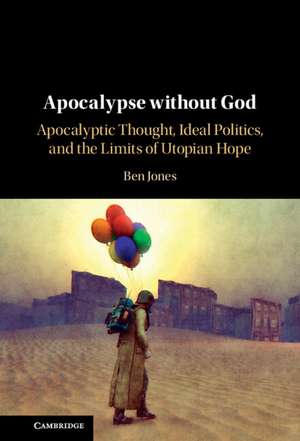Apocalypse without God: Apocalyptic Thought, Ideal Politics, and the Limits of Utopian Hope
Autor Ben Jonesen Limba Engleză Hardback – 20 apr 2022
Preț: 581.32 lei
Preț vechi: 653.17 lei
-11% Nou
Puncte Express: 872
Preț estimativ în valută:
111.24€ • 116.43$ • 92.58£
111.24€ • 116.43$ • 92.58£
Carte tipărită la comandă
Livrare economică 31 martie-14 aprilie
Preluare comenzi: 021 569.72.76
Specificații
ISBN-13: 9781316517055
ISBN-10: 1316517055
Pagini: 200
Dimensiuni: 157 x 235 x 18 mm
Greutate: 0.49 kg
Ediția:Nouă
Editura: Cambridge University Press
Colecția Cambridge University Press
Locul publicării:New York, United States
ISBN-10: 1316517055
Pagini: 200
Dimensiuni: 157 x 235 x 18 mm
Greutate: 0.49 kg
Ediția:Nouă
Editura: Cambridge University Press
Colecția Cambridge University Press
Locul publicării:New York, United States
Cuprins
Introduction; Part I. Secular Apocalyptic Thought: 1. The hazards of studying secular apocalyptic thought; 2. The paradox of secular apocalyptic thought; Part II. Historical Case Studies: 3. Apocalyptic hope's appeal: Machiavelli and Savonarola; 4. Tempering apocalyptic ideals: Hobbes and pretenders to God's kingdom; 5. Reimagining God's kingdom: Engels and Müntzer; Part III. Implications for Ideal Theory: 6. Ideal theory as faith; 7. Limiting the dangers of Utopian hope; Conclusion; Appendix: Argument against ideal theory's plausibility; Bibliography.
Recenzii
'An important theme of several strands of political and theological reflection is that the line between religious thought and secular political thought is not bright. In many respects, secular political traditions draw heavily on religious ideas, often without realizing it. But by itself this thesis is familiar, glib, and often poorly defended. Apocalypse without God is anything but. The book is original, rich, and reflective. It carefully traces the idea of secular apocalyptic thought in important thinkers and ends with a critique of contemporary ideal theory along similar lines. Ben Jones not only reframes secular political theories from the past, but how much political philosophy operates today.' Kevin Vallier, Bowling Green State University and author of Trust in a Polarized Age
'Visions of the ideal drive great plans and stoke great passions. But great plans rest on uncertain assumptions about the future, and great passions bring their own dangers. Ben Jones argues that embracing epistemic humility can temper the violent excesses of utopian hubris, and check ideal theory's pretensions too. Yet this same epistemic humility makes space for utopian hope. A thoughtful, incisive, contemporary twist on a classic problem of enlightenment political thought.' Nomi Claire Lazar, University of Ottawa and author of Out of Joint: Power, Crisis, and the Rhetoric of Time
'In this engaging book, Ben Jones revisits the long history of apocalyptic thought in order to explain its persistent appeal. Where some theorists separate religion and secular theory, Jones shows that religious traditions can enrich political reflection today. With lucidity and insight, he describes a circumspect hope that sustains the struggle for justice in an uncertain world.' David Newheiser, Australian Catholic University and author of Hope in a Secular Age
'Visions of the ideal drive great plans and stoke great passions. But great plans rest on uncertain assumptions about the future, and great passions bring their own dangers. Ben Jones argues that embracing epistemic humility can temper the violent excesses of utopian hubris, and check ideal theory's pretensions too. Yet this same epistemic humility makes space for utopian hope. A thoughtful, incisive, contemporary twist on a classic problem of enlightenment political thought.' Nomi Claire Lazar, University of Ottawa and author of Out of Joint: Power, Crisis, and the Rhetoric of Time
'In this engaging book, Ben Jones revisits the long history of apocalyptic thought in order to explain its persistent appeal. Where some theorists separate religion and secular theory, Jones shows that religious traditions can enrich political reflection today. With lucidity and insight, he describes a circumspect hope that sustains the struggle for justice in an uncertain world.' David Newheiser, Australian Catholic University and author of Hope in a Secular Age
Notă biografică
Ben Jones won a scholarship to Oxford University to study Japanese, then lived in Japan for a few years. While there he started translating, in fields ranging from business and technology through to avant-garde drama and the Bujinkan martial arts (he was the interpreter for 'Ninja grandmaster' Hatsumi Masaaki at seminars around the world). He has since continued this work in the UK, becoming head of the Institute of Translation and Interpreting's Japanese Network, and now runs a successful languages business from his home in Kent. He also runs the boutique publishing house 'Ozaru Books' and performs as a professional musician. Website: www.ozaru.net
Descriere
Explains why apocalyptic thought, despite often being dismissed as bizarre, has persistent appeal in political life.
